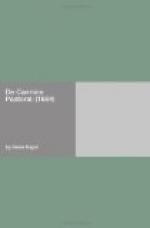I shall not here enquire, tho it may seem proper, whether we can decently bring into an Eclogue Reapers, Vine-dressers, Gardners, Fowlers, Hunters, Fishers, or the like, whose lives for the most part are taken up with too much business and employment to have any vacant time for Songs, and idle Chat, which are more agreeable to the leisure of a Sheapards Life: for in a great many Rustick affairs, either the hardship and painful Labor will not admit a song, as in Plowing, or the solitude as in hunting, Fishing, Fowling, and the like; but of this I shall discourse more largely in another place.
Now ’tis not sufficient to make a Poem a true Pastoral, that the Subject of it is the action of a Shepherd, for in Hesiods erga and Virqils Georgicks there are a great many things that belong to the employment of a Shepherd, yet none fancy they are Pastorals; from whence ’tis evident, that beside the matter, which we have defin’d to be the action of a Sheapard, there is a peculiar Form proper to this kind of Poetry by which ’tis distinguish’d from all others.
Of Poetry in General Socrates, as Plato tells us, would have Fable to be the Form: Aristotle Imitation: I shall not dispute what difference there is between these two, but only inquire whether Imitation be the Form of Pastoral: ’Tis certain that Epick Poetry is differenc’t from Tragick only by {29} the manner of imitation, for the latter imitates by action, and the former by bare narration: But Pastoral is the imitation of a Pastoral action either by bare narration, as in Virgil’s Alexis, and Theocritus’s 7th Idyllium, in which the Poet speaks all along in his own Person: or by action as in Virgil’s Tityrus, and the first of Theocritus, or by both mixt, as in the Second and Eleventh Idylliums, in which the Poet partly speaks in his own Person, and partly makes others speak, and I think the old Scholiast on Theocritus took an hint from these when he says, that Pastoral is a mixture made up of all sorts, for ’tis Narrative, Dramatick, and mixt, and Aristotle, tho obscurely, seems to hint in those words, In every one of the mentioned Arts there is Imitation, in some simple, in some mixt; now this latter being peculiar to Bucolicks makes its very form and Essence: and therefore Scaliger, in the 4th Chapter of his first Book of Poetry, reckons up three Species of Pastorals, the first hath but one Person, the second several, which sing alternately; the third is mixt of both the other: And the same observation is made by Heinsius in his Notes on Theocritus, for thus he very plainly to our purpose, the Character of Bucolicks is a mixture of all sorts of Characters, Dramatick, Narrative, or mixt: from all which ’tis very manifest that the manner of Imitation which is proper to Pastorals is the mixt: for in other kinds of Poetry ’tis one and simple, at least {30} not so manifold; as in Tragedy Action: in Epick Poetry Narration.




